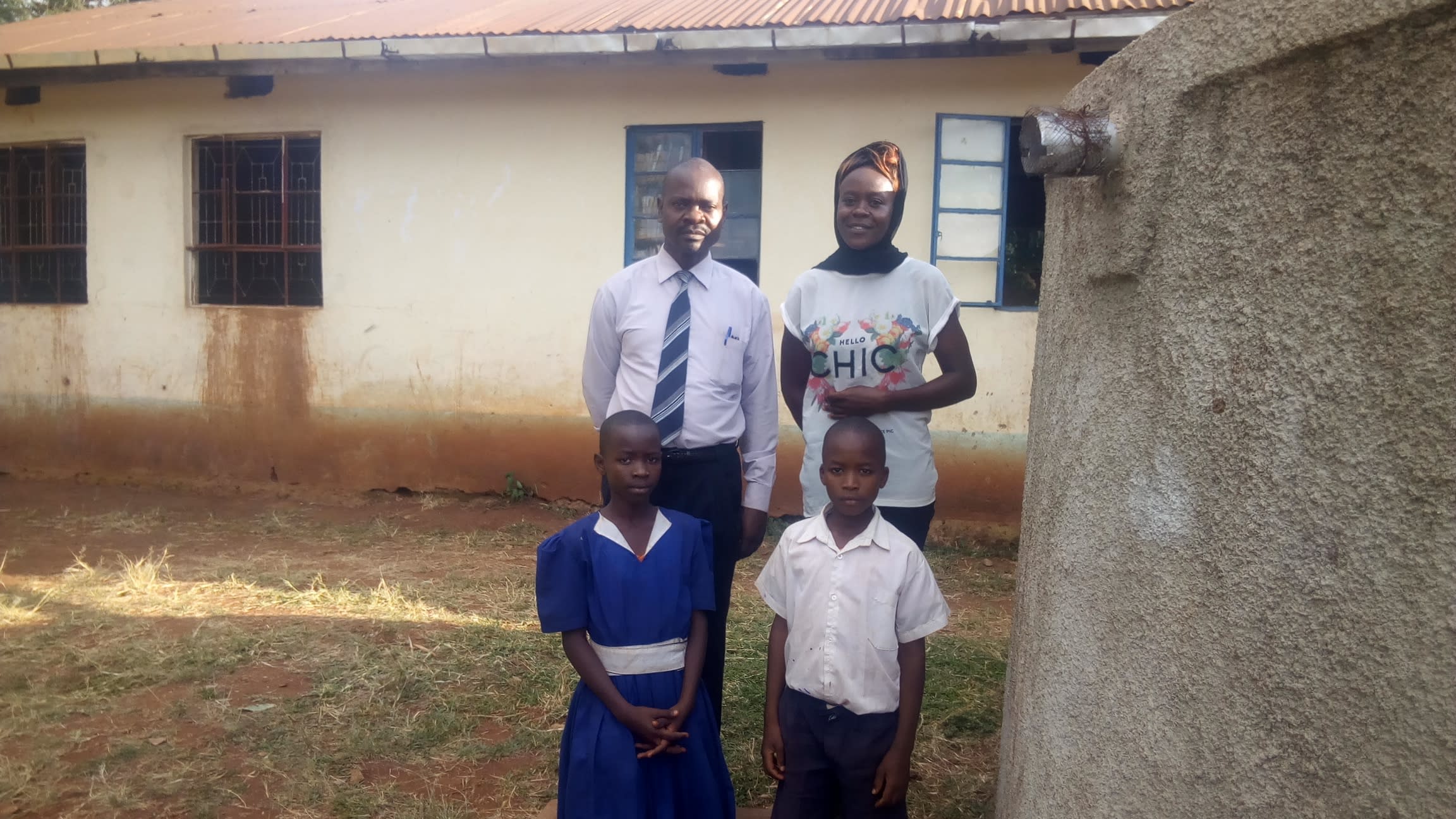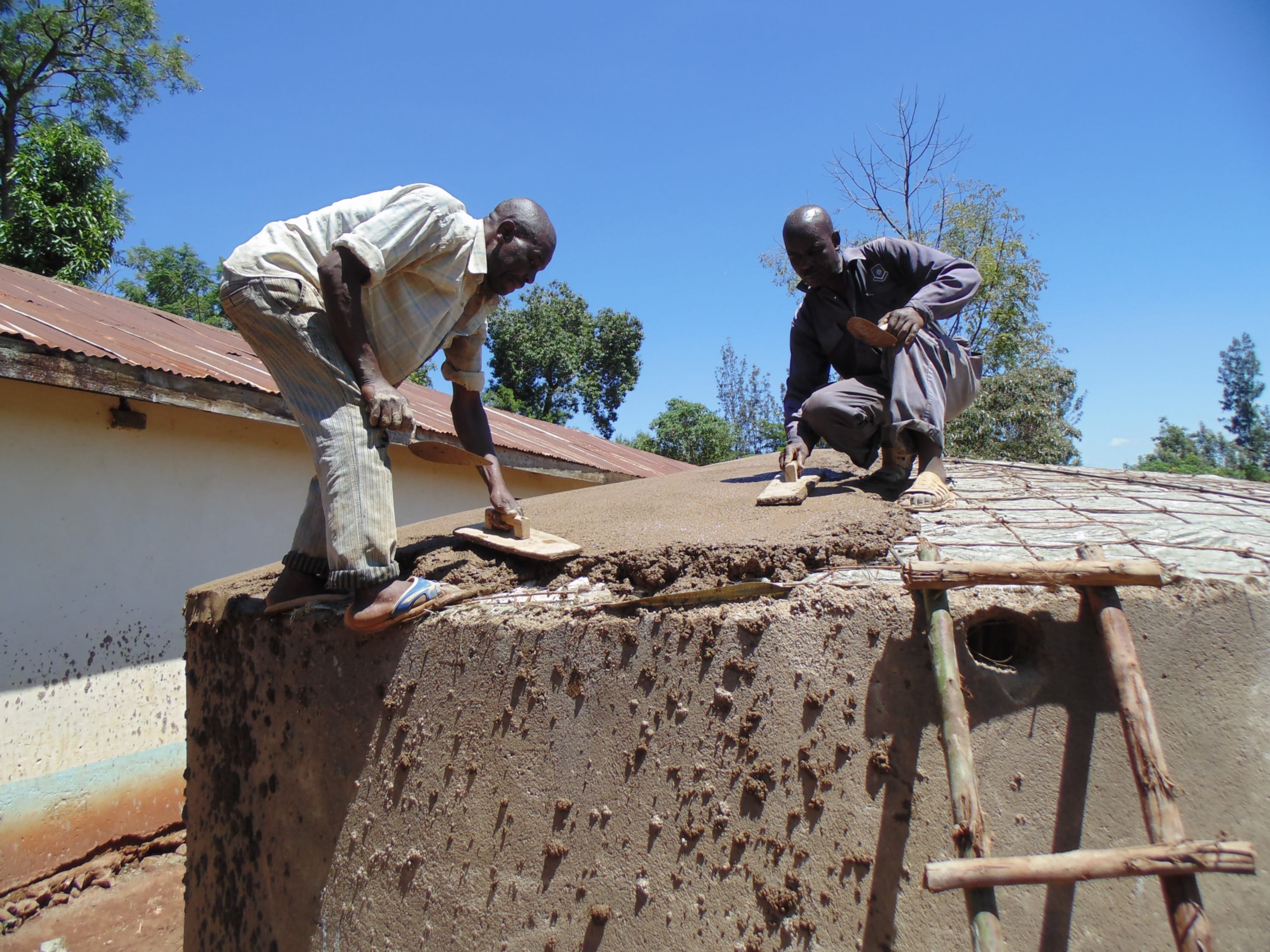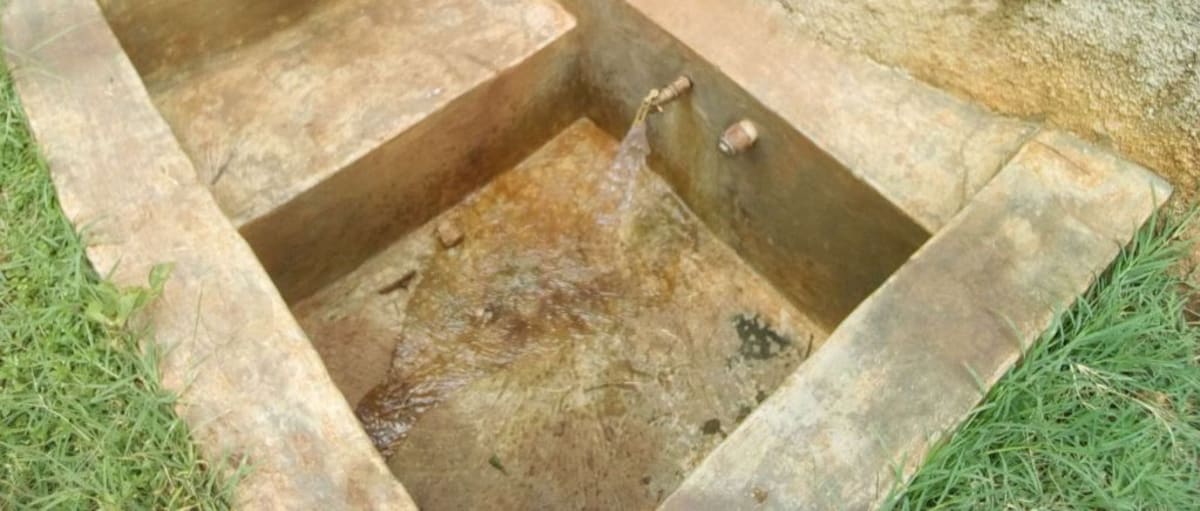This project is a part of our shared program with Western Water And Sanitation Forum (WEWASAFO). Our team is pleased to directly share the below report (edited for clarity, as needed).
Welcome to the School
Ebusiloli Primary School was founded in 1942 by Church of God and their community. It now has a student population of 828 and employs 16 teachers and five support staff.
(Editor's Note: While this many people may have access on any given day, realistically a single water source can only support a population of 350-500 people. This community would be a good candidate for a second project in the future so adequate water is available. To learn more, click here.)
Early in the morning, children report to school carrying water in their jerrycans. The school requires students to bring their own water because they prefer not to send their students out to look for water during the day. The route leading to the closest spring is bushy, and teachers cannot risk sending their pupils to that source. This school has not been welcome in the community.
Cleaning is done between 6:45 AM and 7 AM before normal classes begin. Assembly is held every morning, when school administration makes announcements about scheduled activities and the school salutes the Kenyan flag. Students break at 12:45 PM for lunch. All children from standard one to standard eight return home to eat lunch and then report back to school at 2 PM. Pre-school children do not return to school after lunch.
Afternoon classes end at 3:30 PM, for various activities like ball games and singing games. These are a great opportunity for the children to relax their minds and refresh before returning to class for evening study hall that starts at 4:30 PM. At 5:30 PM, everyone returns home as the security guards arrive to watch over the school.
Water Situation
A well was implemented by another organization, and was intended to be shared by both the school and the community. It has since dried up. The school was given a 5,000-liter plastic tank, but it was cut with a machete by the natives. "This community hates us; I wish I could change the name of this school. We should not bear their name! They have mobilized one another against us and the kind of battles we fight to keep on moving are so fierce. We came to school one day late last year and found water flooded around the base of our good tank, only to realize that it had a deep cut. The evil man cut so low that the tank cannot even hold a quarter of its capacity," the senior teacher explained. Following that incident, an extra security guard was employed to help watch over school property. No stranger is allowed on the premises unless the administration gives permission. Children have been asked to carry water from home, since it is too dangerous to send students to the spring.
Water fetched by students is from many different sources, and is rationed throughout the day. Students suffer from waterborne diseases, clear evidence that the water they bring is not safe. As we watched students arrive at school, we saw some stop along the way and drink directly from their containers.
Sanitation Situation
This was the first time we ever saw a girls' urinal, something we hadn't even heard of! Some girls do not use it as intended, because we saw feces there on the ground. The girls also have 10 doors of pit latrines which are full and poorly-ventilated.
Boys have been given six doors of pit latrines but they are overused and dilapidated. "A boy cannot wait on the queue when pressed, yet we have old latrines here. They just go ahead and use them but we fear they may collapse on our children because floods that flow from the upper side have really weakened their foundations," the teacher in charge of sanitation stated.
Because of the water shortage, these children do not wash their hands after using the latrine. Therefore, they are exposed to many health challenges e.g. diarrheal diseases. There is recent news of two sisters in class five who passed away after having diarrhea and vomiting. "That was the most painful day in my life, seeing bodies of two lovely young and promising girls lie helplessly on those beds and later on observing coffins carrying their remains lowered inside the graves was traumatizing. The whole community came to school and caused havoc, demanding the headteacher to be fired for failing to maintain required hygiene standards, yet those little girls who had passed on were from Emang’ali," the senior teacher recalled. People from this village rioted, yet they don't even bring their children here to study.
Teacher Naftali Rurie said, "We have suffered a lot because of poor health. This whole village does not understand hygiene, and they need to be taught. Therefore, having a hygiene training will be a blessing to all of us."
Plans: Hygiene and Sanitation Training and Hand-Washing Stations
Training will be held for two days. The facilitator will use PHAST (participatory hygiene and sanitation transformation), ABCD (asset-based community development), CTC (child to child), lectures, group discussions, and handouts to teach health topics and ways to promote good practices within the school. The CTC method will prepare students to lead other students into healthy habits, as well as kickstart a CTC club for the school. This CTC club will oversee the new facilities, such as hand-washing stations, and make sure they are kept clean and in working condition. The two hand-washing stations will be delivered to the school, and the club will fill them with water on a daily basis and make sure there is always a cleaning agent such as soap or ash.
Plans: Rainwater Catchment Tank
A 50,000-liter rainwater catchment tank will be constructed on school grounds. Teachers, students, and parents will gather the materials needed for this project, including sand, ballast, bricks, and hardcore. This contribution will fuel a sense of responsibility for the school and community to take care of their new facilities. Once materials are mobilized, the WEWASAFO team will arrive to lead the construction effort.
With adequate clean water, the school will have water for drinking, cooking, cleaning, and hand-washing. The school will no longer have to rely on the small amounts of (often contaminated) water carried by students.
Plans: VIP Latrines
Two triple-door latrines will be constructed, normally providing three new latrines for each gender. However, the headteacher has requested that all six doors be given to girls. He requested this via text message to one of our staff, also texting, "At least our boys have six functional doors. Girls are suffering! Imagine seeing other people's fece,s then squatting down to add yours on top when afraid that the level might reach your body. It is pathetic!" Latrine materials will be mobilized the same way as the tank, ensuring the school feels these facilities are truly theirs. And with a rainwater catchment tank nearby, there will be enough water to keep them clean.
School administration and parents are positive that with these new facilities and training, their students’ academic performance will improve. Students will be healthy and empowered to focus on what’s important!

 Rainwater Catchment
Rainwater Catchment
 Rehabilitation Project
Rehabilitation Project

































